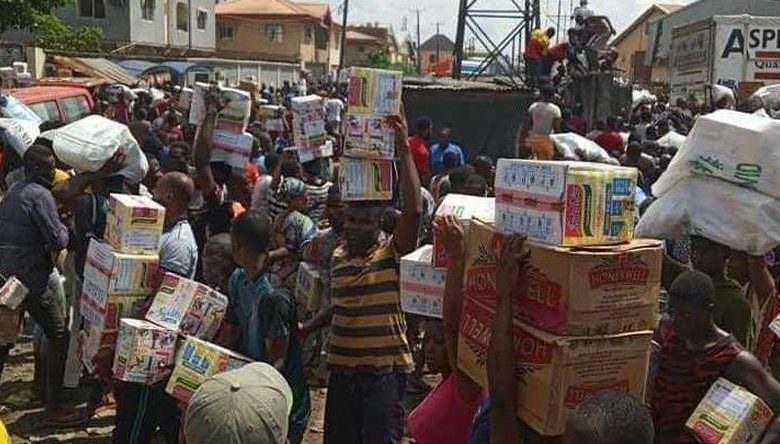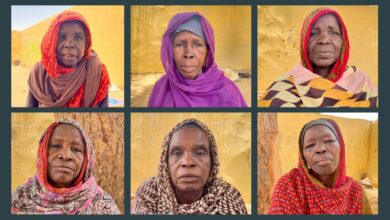Mass Looting Of COVID-19 Palliative Warehouses Continues Across Nigeria

It all began last Wednesday when it was discovered that the Oba of Lagos, Rilwan Akiolu, had hoarded COVID-19 palliatives given by the government and private sector donors in his palace.
Since then, there have been numerous reports of similar looting at various warehouses in Lagos, Kaduna, Jos, Edo, and other parts of the country, all of which housed food items meant to cushion the effects of the lockdown regime on the less-privileged in those areas.
Food items like rice, spaghetti, instant noodles, garri, and other more given by the Ministry of Humanitarian Affairs, Disaster Management and Social Development, were discovered in huge amounts, with the people carting away what they have said was theirs in the first place.
In Kaduna, the residents broke into a warehouse in Barnawa, taking away the food items they found stored away, but security officials were called to the scene to disperse the gathering crowd.
Edo saw a swarm of people as well, breaking their way into a warehouse in Uselu, Benin, looting various items from toiletries to beans and so on. The situation led to the state governor, Godwin Obaseki, addressing the issue, stating that it was necessary for the government to have a reserve as indications had pointed to a possible second wave of the coronavirus pandemic.
The scenes in Jos from videos that surfaced online showed people gathered in the thousands around a warehouse also storing palliatives, with some being tossed from the rooftop for the massive crowd to collect.
The Lagos State government on Wednesday condemned the vandalisation of its warehouse at Mazamaza, which it admitted was housing palliatives donated by the private sector-led Coalition Against COVID-19 (CACOVID) group.
“The items belong to the Southwest, contrary to social media reports that they are all for Lagos,” the government said.
“Governor Babajide Sanwo-Olu had on September 22nd 2020, formally taken receipt of the food palliatives from the CACOVID team meant for distribution to the indigent. The State had repackaged its share of the consignment and was distributing it before the protests that have affected activities in the State.
“The distribution was on-going but had to be halted due to protests, before the invasion of the warehouse today,” it added.
The nationwide looting exercise has, meanwhile, escalated beyond palliative stores. In Ilorin, Kwara State capital, for example, the Nigeria Customs command was also burgled as well as Palms Mall, Shoprite, and other prominent shops. This led the state government to declare a 24-hour curfew on Saturday to prevent the further breakdown of law and order.
“Our observation is that what has happened so far today was not a protest. It cannot be defended under any guise. It was a pure act of criminality. Some persons are hiding under the nationwide tension to commit crimes,” announced the governor, AbdulRahman AbdulRazaq.
“Lives are being threatened. Businesses are being looted. Public properties have been targeted. This is unacceptable. It is not who we are.”
In other states, the people have taken to attacking the residences of lawmakers and other politicians and carting away social welfare packages, furniture items, and other valuables.
The United Nations’s Food and Agriculture Organization (FAO) had earlier in the year reported that about seven million Nigerians would experience food shortages between the months of June and August alone. This is coupled with the reality that about 40 per cent of the population lives below the poverty line, according to the National Bureau of Statistics (NBS).
This figure has only worsened with the effects of COVID-19, which has not only led to reduced agricultural outputs but has put many out of jobs.
The Ministry of Humanitarian Affairs, Disaster Management, and Social Development and concerned parties have mostly remained silent on the discovery of the hoarded palliatives, which has led to questions on the transparency of the distribution process, and why they remained locked away for so long.
Currently, Kaduna, Cross River, Kwara, Plateau and Edo state are all under complete or partial curfews to contain looting and vandalism.
Support Our Journalism
There are millions of ordinary people affected by conflict in Africa whose stories are missing in the mainstream media. HumAngle is determined to tell those challenging and under-reported stories, hoping that the people impacted by these conflicts will find the safety and security they deserve.
To ensure that we continue to provide public service coverage, we have a small favour to ask you. We want you to be part of our journalistic endeavour by contributing a token to us.
Your donation will further promote a robust, free, and independent media.
Donate Here




